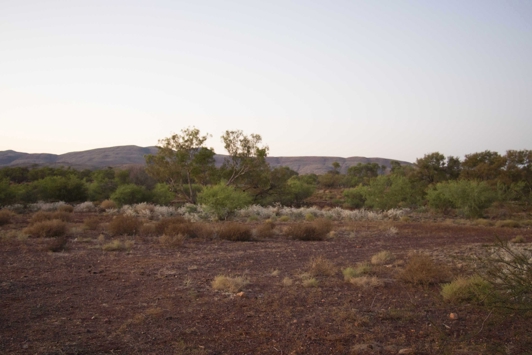The Northern Beef Development program aims to support Western Australia’s (WA) northern beef industry to become more profitable, resilient and sustainable. Northern Beef Development coordinates a program of research and capability building projects to support industry to improve land use, livestock productivity and labour efficiency.
Key projects
Pastoral remote sensing tool
The program has developed a web-based decision support tool, which land managers can now use to make informed, timely management decisions to support sustainable rangeland management.
Pastoral remote sensing tool
Access the toolSterile leucaena
A research project to develop a sterile variety of Leucaena is being led by the Northern Beef Development program. A sterile variety of Leucaena will provide high-value, cost-effective fodder that poses minimal risk to the rangelands environment. This project is co-funded by the MLA Donor Company.
Pastoral agriculture
A series of field trials have been established in the West Kimberley to investigate on-station irrigated fodder production. Trials are evaluating biomass, feed quality, and cost of inputs of a wide range of agricultural species. The results of this research will also inform policy on balancing agricultural potential with environmental risks.
Producer Demonstration Sites
The Northern Beef Development program is collaborating with stations in the Pilbara, West Kimberley and East Kimberley to demonstrate:
- Managing animal welfare at weaning through use of pain relief products.
- The ‘Easy P’ phosphorus supplementation method.
The Producer Demonstrations Sites are co-funded by the MLA Donor Company.
MLA Northern Breeding Business
Northern Breeding Business (NB2) is a training and mentoring program developed by Meat & Livestock Australia to increase reproductive rates, increase turn-off weights and improve genetic potential in northern herds.
Northern Beef Development is supporting Kimberley-Pilbara pilot producer groups to take part in NB2.
Genetics and breeding extension program
This program will upskill pastoralists in how to pursue genetic improvement by selecting bulls using breeding values and through breeding program design.
Producer Innovation Fast Track Grants program
The Producer Innovation Fast Track Grants aim to accelerate industry adoption of proven, regionally and business relevant research, development, and innovation.
Producers had the opportunity to apply for dollar-matched funding to implement a new technology or practice into their business. A range of projects are now underway and grant recipients are seeing significant benefits.
Aboriginal Economic Development
The Northern Beef Development team work closely with DPIRD’s Aboriginal Economic Development (AED) team.
15% of WA’s northern pastoral industry workforce identifies as Indigenous, and there are significant opportunities for increased Indigenous workforce participation through structured career pathways.
AED coordinates the Aboriginal Pastoral Academy, which provides a supported career path for young Aboriginal people, and a skilled entry-level cohort for the pastoral industry workforce. Participants learn practical skills with cattle and horses, while also learning the foundational skills to be ‘job ready’ to work in the pastoral industry.
AED is engaging with Aboriginal pastoral enterprises to assess and transition to alternative business models including grazing licences, agistments, and sub-leases, to attract investment into the Aboriginal pastoral estate and create job opportunities.
AED is also assisting the Department of Planning, Lands and Heritage with the divestment of Aboriginal Lands Trust pastoral stations back into local community ownership.
Technical information and resources
Northern Beef Development is a collaborator with FutureBeef, which is a technical and production information library for the northern pastoral industry. DPIRD Beef Development Officers develop videos, case studies and articles to extend proven, regionally relevant research and development to pastoralists.
Program case studies
Grazing irrigated pastures in northern Australia - video series
In this three-part video series, Dr Kevin Bell (Innovations manager, Pardoo Wagyu) and Carla Milazzo (Development Officer, DPIRD) share their insights, experience and research results on how to successfully graze cattle on irrigated pastures in northern Australia.
- Part 1 - Key principles
- Part 2 - Best management practice
- Part 3 - Troubleshooting.
The series will auto-play, or you can click the playlist icon to view all 3 videos.
Mandora Station Water Medication Trial
Mandora Station Manager David Leppard describes the benefits of automated water medication for cattle in WA’s West Kimberley region. He also discusses working with DPIRD to secure a grant to assist with purchasing the equipment.
Anna Plains Station Optiweigh Trial
David and Jo Stoate from Anna Plains Station in WA’s west Kimberley region discuss the benefits of the Optiweigh in-paddock weighing unit. They also detail how they worked with DPIRD to receive a grant to assist with the purchase.
Managing spinifex pastures
Discover how DPIRD’s support for the Managing Spinifex Pastures project is helping unlock the full potential of spinifex landscapes in Western Australia. Through interviews with pastoralists, Traditional Owners, and rangeland scientists, this project brings together diverse knowledge and experience to improve the management of spinifex pastures.
Past program resources
The Northern Beef Future program’s past reports and resources are below.
-
Spinifex pastures - characteristics and managementpdf (7.7 MB)
-
Insights into spinifex (triodia) species, pastures and their managementpdf (2.49 MB)
-
Broome and Halls Creek Truck wash feasibility reportpdf (6.99 MB)
-
Offline mobile map appspdf (618 KB)
-
Pilbara Cattle Holding Yards Feasibility Assessment reportpdf (6.3 MB)
-
Pilbara Truck Wash Feasibility Assessment reportpdf (3.31 MB)
-
Profiling Chinese agribusiness beef investment in Australiapdf (2.78 MB)
-
Valuing security of supply for WA beef productspdf (1.23 MB)
-
New and innovative beef supply chains in Thailand
-
Innovative business models for value creation in the WA beef sector
-
Potential for rangeland grassfed assurance programs in Western Australia
-
Northern beef infrastructure audit
-
Collaboration and trust in the northern beef supply chain in WA
-
Joining the dots on ten key northern beef futures informing studies
Contact us
-
Northern Beef Development team

